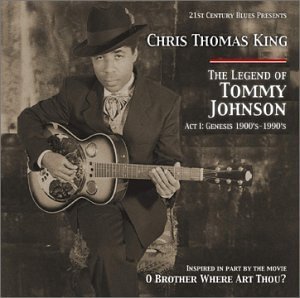O Brothers Where Art Thou?

Sitting down earlier this evening over homework, I remarked to my son that I didn't know what I'd post on my blog. He casually tossed out an idea to tie in something about Black History Month. He suggested I talk about Chris Thomas King, a formidable blues musician who readers will remember as the character Tommy Johnson in the Cohen brothers fim, "O Brother, Where Art Thou."
King, and his presence in the movie as Johnson (who is thought to have lived in the Delta and to have authored many of the songs credited to the much revered bluesman Robert Johnson, who's main contribution was to record them), raises a hard-to-ignore point about bluegrass and traditional music in general that frustrates me because, well, bluegrass is what it is.
Like most any industry, it's dominated by, well, white guys. Now, most of the time I'm not all that sensitive to this, because bluegrass as popularized by Bill Monroe and Lester Flatt and Earl Scruggs was and is largely a genre carried by majority musicians and fans. Last fall, I did see a family or two of color in Nashville at IBMA World of Bluegrass; the year before, when it was hosted in Louisville, the only people of color I saw during the entire three days were the men and women serving the sodas.
This was upsetting both on a personal level and on the professional level and concern I have that this music receive the fair and accurate treatment it deserves, outside of academic circles. The story of bluegrass does not begin or end with Monroe or McCoury. There are countless ways in which the music we know as bluegrass originated in African traditions. An instrument most central to the music, the banjo, is essentially derived of the African banjar. The spirituals and worksongs of slaves have made their way many times into the ranks of what are considered bluegrass favorites. To be sure, there were plenty of black secu lar songs as well, popularized throughout the Southern mountains and shared by families of all races. And it would be foolish to discount the contributions of instrumentalists like guitarist Leslie Riddle; were it not for Riddle and his ability to remember songs unlike his friend A.P. Carter, whom Riddle accompanied on many a song collecting journey, A.P. would not have left the musical legacy credited to the Carter Family.
lar songs as well, popularized throughout the Southern mountains and shared by families of all races. And it would be foolish to discount the contributions of instrumentalists like guitarist Leslie Riddle; were it not for Riddle and his ability to remember songs unlike his friend A.P. Carter, whom Riddle accompanied on many a song collecting journey, A.P. would not have left the musical legacy credited to the Carter Family.
So there you have a bit of an educational rant. As the story of bluegrass and traditional music unfolds for me personally, I want to make sure it is retold in full wherever it is to be shared. This is not the whole story, but it's a start.

0 Comments:
Post a Comment
<< Home